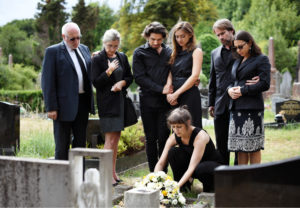 If you have lost a loved one because of someone’s negligence, you can and should hire Cook Country wrongful death lawyers and sue the guilty party. To make a successful claim, you need to prove the following elements:
If you have lost a loved one because of someone’s negligence, you can and should hire Cook Country wrongful death lawyers and sue the guilty party. To make a successful claim, you need to prove the following elements:
Duty of Care
You need to prove that the negligent party had a duty of care, or was in a position to act responsibly regarding the deceased. For example, doctors must ensure that the patients under their care are well taken care of. Similarly, a driver is responsible for ensuring that other drivers and pedestrians are safe from them on the road.
Breach of Care or Duty
If your Cook County wrongful death lawyers determined that the defendant had a duty of care to the deceased, they have to prove that they violated that duty. In the case of a negligent doctor, it can be a misdiagnosis or incorrect surgery that leads to death. For a driver, it could be texting while driving, which leads to a fatal accident.
Causation
You need to prove that the breach of duty mentioned above was the main reason behind the deceased’s death. In other words, your Cook County wrongful death lawyers will have to prove that the malpractice caused the death or that the fatal accident caused by the distracted driver led to the fatality.
Who Can File a Wrongful Death Lawsuit
Since the deceased cannot file a lawsuit, their family or heirs can. This can be their children, spouse, or even a court-appointed individual from the family. However, distant relatives may also have this right if the deceased doesn’t have any surviving family members. Your relationship with them is critical when it comes to determining the compensation you may receive.
In some cases, the case may not be based on negligence. If your loved one died because of a faulty product, the wrongful death claim would focus on its effect on you, along with the emotional/financial issues you faced because of it.
Keep in mind that certain agencies or individuals cannot be sued for wrongful death. This includes government agencies and employees. If you still think you have a valid claim against them, get in touch with Robert Edens for a meeting as soon as possible.
Contact the Law Offices of Robert T. Edens for A FREE Consultation
If you lost a dear friend or a family member because of someone’s negligence, get in touch with our wrongful death lawyers in Antioch at the Law Offices of Robert T. Edens today. We have been fighting for the rights of people like you for several decades – we are known for representing our clients aggressively if it means they get the compensation they deserve.
From the accident right up to the tragic event, you will be harassed by the insurance company. They will try to reduce the value of your claim so they don’t have to pay as much. Please do NOT talk to them till you have your consultation with us. Get in touch with us for a meeting, and we will explain why you should never do that and the options you have at your disposal.

 If your loved one has died due to the negligence or recklessness of someone else’s behavior, you can file a wrongful death lawsuit. This lawsuit determines the compensatory money and damages that you should receive due to the wrongful death of your loved one. While money certainly will not help ease your pain, it can reduce your monetary burden and ensure that you remain financially stable.
If your loved one has died due to the negligence or recklessness of someone else’s behavior, you can file a wrongful death lawsuit. This lawsuit determines the compensatory money and damages that you should receive due to the wrongful death of your loved one. While money certainly will not help ease your pain, it can reduce your monetary burden and ensure that you remain financially stable.
 Wrongful death can be devastating for a family. Wrongful death can occur due to medical malpractice, negligence at work, or an accident. All wrongful death claims in Illinois are covered under
Wrongful death can be devastating for a family. Wrongful death can occur due to medical malpractice, negligence at work, or an accident. All wrongful death claims in Illinois are covered under 